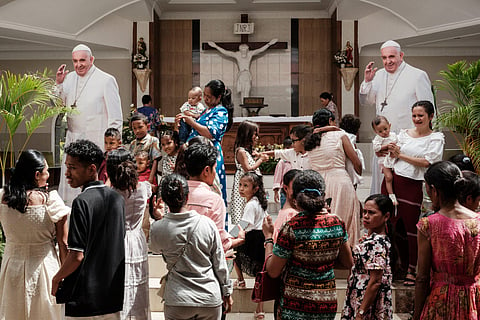
- NEWS
- the EDIT
- COMMENTARY
- BUSINESS
- LIFE
- SHOW
- ACTION
- GLOBAL GOALS
- SNAPS
- DYARYO TIRADA
- MORE

DILI, East Timor (AFP) — When Pope Francis becomes the first pontiff to visit an independent East Timor, he will confront a clergy beset by child abuse scandals that have been largely ignored by the deeply Catholic country’s freedom heroes.
Cases include Nobel-winning Bishop Carlos Ximenes Belo, who helped Asia’s youngest nation free itself from Indonesian occupation, but who the Vatican secretly punished over claims he had sexually abused young children for decades.
There are calls for the 87-year-old pontiff to speak out on child abuse when he lands in the former Portuguese colony Monday as part of his Asia-Pacific tour.
“We ask Your Holiness to encourage the leaders and the people of Timor-Leste to take more effective measures to prevent sexual abuse,” the Timor-Leste NGO Forum, a civil society coalition, wrote in a letter Wednesday to Francis.
BishopAccountability.org, a documentation center on Catholic Church abuse, also called on the Vatican’s sexual abuse commission chief, Cardinal Sean O’Malley, to “urge” Francis to “be the victims’ champion” on his visit.
Catholic-majority East Timor is one of many countries that has suffered the global scourge of child abuse by members of the clergy long veiled in secrecy.
In 2002, Pope John Paul II accepted the abrupt resignation of Bishop Belo, then the head of East Timor’s church, who shared the Nobel Peace Prize in 1996.
The Vatican said it was for health reasons but did not explain further.
It then permitted him to be sent to Mozambique as a missionary where he worked with children, before he moved to Portugal.
The Vatican secretly sanctioned the bishop in 2020 after claims he sexually abused underage boys over a 20-year period up to 2002.
It banned Belo from any contact with children or with East Timor, conditions it said he formally accepted.
Only when Dutch magazine De Groene Amsterdammer reported the restrictions in 2022, including testimony from a victim who said they were raped by Belo, did the Vatican go public.
The Dutch magazine report’s author says allegations about Belo were known in 2002.
Francis later suggested the decision to let Belo retire instead of face consequences was made when attitudes were different.
